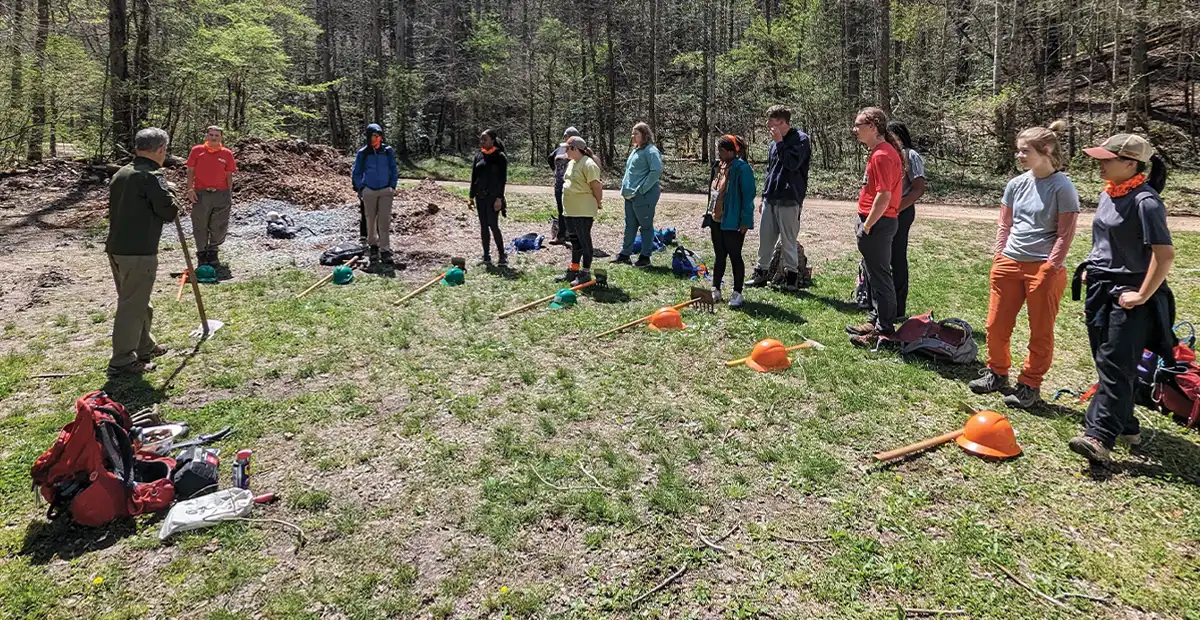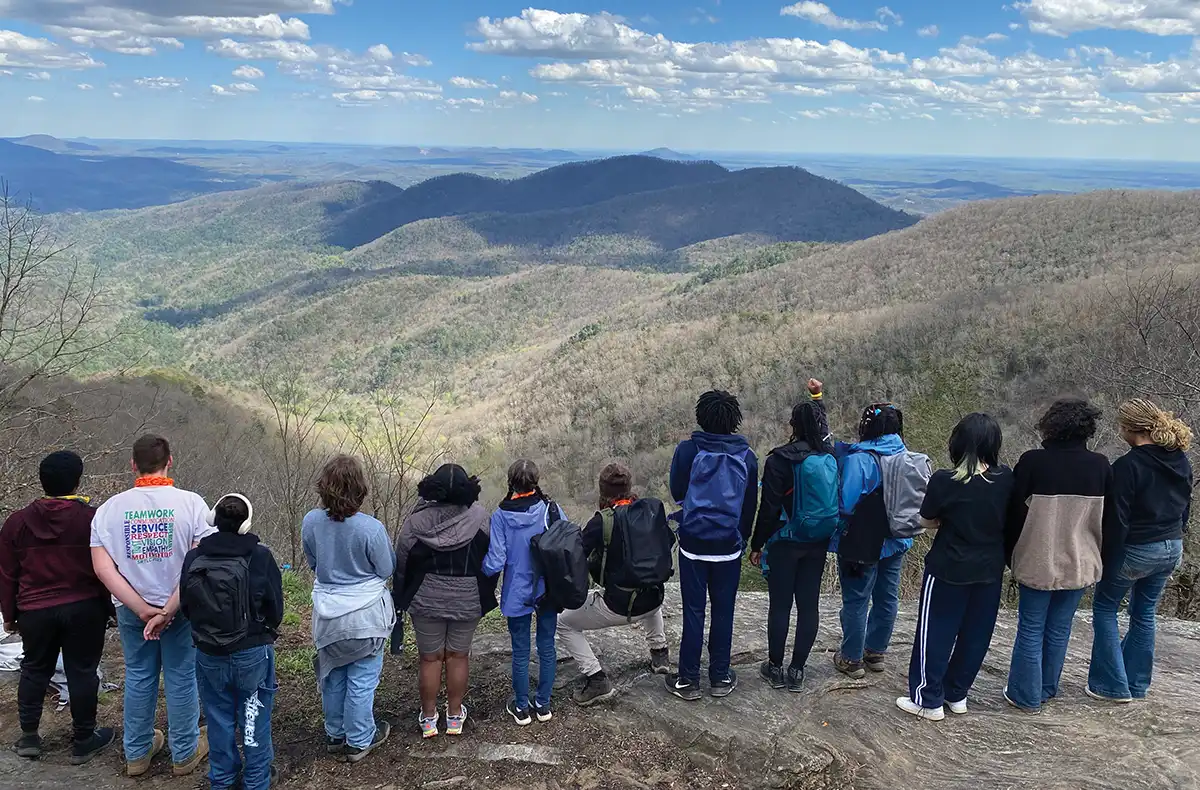Youth in Trail
Maintenance and
Protection
/ by Heather B. Habelka


Top: Trail stewardship is a vital part of the NextGen Forest Ambassadors program. Photo by Rachel Lettre. Bottom: NextGen ambassadors learn important outdoor skills, such as building campfires, camp safety, and identifying species they may find on the Trail. Left photo by Sarah Adams, center photo by Emily Fussell, right photo by Rachel Lettre.
By collaborating with local and national organizations, the ATC has developed successful programs for engaging teens on the A.T.
Teens are powerful voices for stewardship. The Appalachian Trail Conservancy partners with several organizations to activate these voices and set into motion a ripple effect of stewardship, inclusive connection, and skill development. The ATC’s investment in youth programs is critical to cultivating the next generation of stewards through a shared connection and sense of belonging on the A.T. Not only do program participants learn about nature and the outdoors, but they come to understand the important role that the A.T. plays in conservation and how those lessons relate to their communities at home.
Forest Ambassadors
This April, the ATC and its partners welcomed thirty students — in grades eight through eleven — from thirteen schools across Georgia and Metro Atlanta counties to serve as NextGen Forest Ambassadors. NextGen is an entirely free program for students who undergo a rigorous application process, and provides transportation and some essential outdoor gear, as well as a small stipend upon successful completion of a stewardship project. Now in its seventh year, NextGen has been hosted by the ATC’s partner for youth engagement, the Georgia Mountains Children’s Forest Network, and is run as a partnership with the ATC, Georgia Appalachian Trail Club, US Forest Service – Chattahoochee-Oconee National Forest, The Greening Youth Foundation, Georgia Mountain Research and Education Center, West Atlanta Watershed Alliance, and Southern Appalachian Wilderness Stewards.
Together with their leaders, instructors, mentors, and alumni counselors, the ambassadors participated in four days and three nights of expert-led camping at Wahsega 4-H Center in Dahlonega, Georgia, and a one-day hike on the Appalachian Trail. During the program, the students learned about Leave No Trace principles and A.T. maintenance, honed outdoor skills, took time for self-reflection, and contributed to solutions-based conversations on how to connect young people with the A.T.

Above: Before they go into the field, students gather for a tool talk and a tailgate session — a discussion about safety while performing trail maintenance. Photo by Sarah Adams. Below: Students pause during their hike to take in the view from Preachers Rock, an outcrop near the summit of BIG Cedar Mountain. Photo by Stefan L. Moss.

“It’s all about the outdoors, and the ATC is a microcosm of the outdoor community,” explains Robert “Bo” Bobinski. He is a member of the Georgia A.T. Club and a Leave No Trace Georgia State Advocate. “Taking kids outdoors teaches resiliency and takes them out of their comfort zone. Going outside is an easy resource to help young people become more self-aware and develop different perspectives. They transform by overcoming fears and insecurities.” Bobinski, a NextGen Program Leader and Instructor, has been part of NextGen since the program’s inception in 2017. He has observed that students who participate in the program become more self-sufficient and require little to no guidance. “They start taking initiative. They grow up a little.”
Courtney, a high school junior and Georgia A.T. Club member, participated as an ambassador this year. The 16-year-old recalls developing a love for the outdoors as a baby when her mom would take her hiking on her back. “My school community lives inside, not outdoors like the Trail community. When I’m outside I disconnect from the stressful things in my life. Being outside is grounding. I notice more. I’m less overwhelmed.”
Kleevens Gabriel, an 18-year-old NextGen alumni counselor, came to the United States from Haiti four years ago with his mother and sister. He was introduced to the ATC during his high school garden club’s hiking trip on the A.T. Approach Trail. It was there that he first crossed paths with Bobinski. “The hike and learning about Trail maintenance was a great experience. I loved how I felt about this version of myself on the A.T. and how it reminded me of hiking with my father and cousins in Haiti.” Gabriel was an ambassador in 2022 and then became an alumni counselor. “Through NextGen I’ve made great friends I can trust and talk to. It feels so healthy to sit together, talk around a fire, and share a lot. When I’m feeling overwhelmed, this program keeps me emotionally in check. The challenge is to carry this mindset into daily life. It’s peaceful and empowering.”
The curriculum’s strategic lack of Wi-Fi fosters the students’ personal growth and critical skill development. “When there’s no service and phones are tucked away, they find things to do. We watch them ease into face-to-face communication,” Bobinski explains. For Courtney, the anticipation of social interaction was one of the most challenging aspects of the program. She set a goal to talk with everyone, which she accomplished. “There’s always something you can learn from someone, whether I’m around people my own age or older. After NextGen, I’ve changed. I’m better at talking to people,” she says.
Courtney’s stewardship project was a book that features her illustrations and photos. She writes about the differences between linear and circular planning. She sees linear planning as being more prominent in our society and economy, while circular planning — the idea that everything is recycled — is something that’s seen less, but is more sustainable. She also explores declining biodiversity as a result of excessive human consumption.
Throughout their time together, the ambassadors also explore ways to carry their education and immersive experiences into their homes, schools, and communities. According to Bobinski, “With all the different groups and viewpoints involved with NextGen, the kids get to watch a lesson in cooperation. We are keenly aware that we are mentoring, but we are also modeling behavior for the ambassadors and the alumni. We are leading by example.” He shares the story of a student whose family — due to cultural norms — didn’t recycle. But after his experience as an ambassador, he was able to bring the sustainability practice of recycling into his home.
For Mia, a 17-year-old high school senior and alumni counselor, the NextGen Ambassador experience led her to a commitment to conservation. “When I joined NextGen in 2022, I had an eye-opening experience about how much I enjoyed living outside and experiencing a non-digital lifestyle,” she says. “My love for hiking and the A.T. grew so much and so did my desire to keep the forest clean and to save it.”
For many participants, the NextGen experience shapes future academic and career goals. Courtney plans to publish her book and to study environmental science and sustainability in college. The program strengthened Mia’s desire to teach others. “Being an alumni counselor teaches me leadership skills, and how to speak in public,” she says. “It has grown my passion for educating.”
This summer, Gabriel will participate in the National Wildlife Federation’s Earth Tomorrow Summer Institute. When he enters college this fall, he’ll study environmental and civil engineering. He plans to become an engineer and travel the world to develop sustainable buildings and cities. In addition, his experiences as a child and on the A.T. have inspired a longer-term mission. “I hope to one day return to Haiti and rebuild my home country to bring it back to its beauty.”
As a returning NextGen alumni counselor, Gabriel was challenged by the group’s larger size. “I intentionally mixed up seating to build a family connection. By the end of the four days, we were all sharing the nature experience on the A.T.”
According to Sarah Adams, ATC Regional Manager – Georgia & Nantahala, the program cohorts unite a diverse range of students throughout the Atlanta and North Georgia area. “Many of them haven’t been on the A.T. or in a national forest until this program. It’s a rare moment to create a connection that they will keep into adulthood. I’m amazed by how many of the dedicated trail volunteers I work with trace their inspiration to volunteer back to a childhood experience on the A.T. I take great comfort in knowing that programs like this one help plant seeds for the next generation.”
The success of the NextGen Forest Ambassadors program has inspired the ATC to seek out and expand youth-focused partnerships along the entire Trail. For example, Rachel Lettre, Mid-Atlantic Regional Director, recently has been working with Outward Bound — a national leader in outdoor education for young people. Participants are introduced to stewardship opportunities and local Trail Maintaining Clubs on the A.T. in Maryland and Pennsylvania (see sidebar below). While the focus of each program is unique, the stewardship and life lessons learned and the communities that are formed and cultivated are constant.
“There’s a sense of community that builds,” Courtney shares. “The A.T. is an inclusive community regardless of your personal purpose of the hike. What you put into the A.T. community you get back.”
Editor’s Note: The last names of students under age 18 were deliberately omitted for privacy reasons.

Outward Bound’s Get Out And Lead
“The GOAL expeditions focus on building self-esteem and leadership skills,” explains Olive Fine, Expedition Program Manager with Philadelphia Outward Bound School. “We focus on how those leadership skills might develop when youth are actively engaging with service toward the trail they’re hiking on. We want to help students understand how much work and effort goes into the trail, river, and campsites that they walk, paddle, and sleep in.”
The Trail maintenance projects done by the students include clearing brush, cutting back branches, removing debris, rerouting water runoff, and checking that Trail markers are visible. “These youth engagement programs are a great model of how A.T. Maintaining Clubs can partner with organizations to get work done on the Trail while introducing young people to stewardship,” explains Rachel Lettre of the ATC. According to Fine, the opportunity for students to work with enthusiastic Trail professionals and receive thoughtful answers to different questions has been very beneficial. Students realize there are career opportunities in stewardship and that they can have a say in how natural resources are managed. Cole adds, “They also develop a new awareness and appreciation that they can become stewards of their own backyards and join local hiking clubs and field outings.”